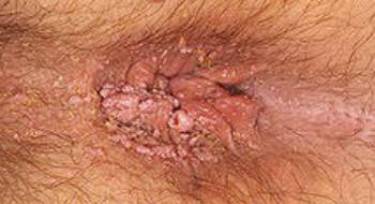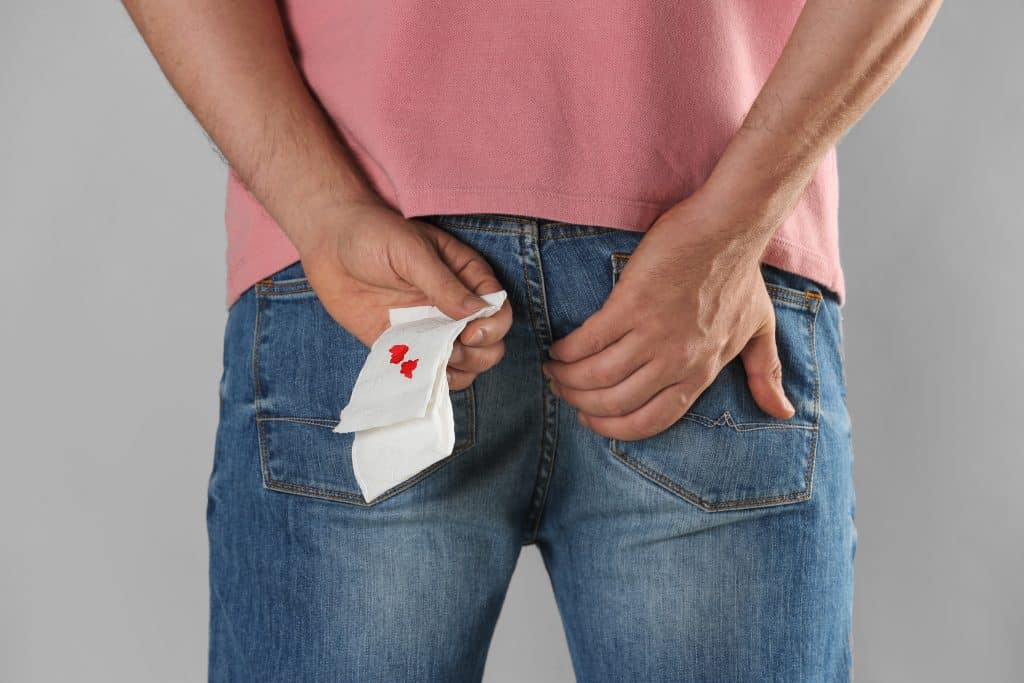Warts, or anal condyloma, are caused by the Human Papilloma Virus (HPV) infection. This infection is one of the most common sexually transmitted diseases. Most men and women are carriers of this virus.

Condyloma physiology:
Anal Warts are an overgrowth of tissue caused by the Human Papilloma Virus (HPV). The virus lives in your cells and can either remain dormant or activate the cell to create warts. There are over 50 types of HPV viruses. Types 6 and 11 are the ones which lead to warts.
HPV transmission:
The most common way of contracting the Human Papilloma Virus is through anal intercourse or anal sexual activity. This could have happened years ago and now the warts are developing. It is known that women who engage in intercourse at an early age (15) and with more than 2 partners have a 95% chance of contracting the Human Papilloma Virus. This shows the prevalence of this virus.

Symptoms of Anal Condyloma:
- Soft lumps around or inside of anus
- Brown, pink, yellow, or flesh-colored lumps that might cluster around anus
- Bleeding from anus
- Itching
How Do You Get Anal Condyloma?
Anal warts are caused by the human papillomavirus. HPV is the most common sextually transmitted infection in the United States, affecting millions of people. There are several types of HPV. Some strains of the virus may not cause any health issues, while others can cause cancer, including cervical and anal, and other viral types cause anal condyloma.
The HPV vaccine can help protect against many of these strains, including ones that cause cancer, but it does not protect completely against anal condyloma. Those who are at an increased risk for anal condyloma are individual who:
- Has anal sexual intercourse or skin-to-skin contact with a person with HPV
- Engages in unprotected anal sex
- Has multiple sexual partners
- Has a weakened immune system
To protect yourself from anal condyloma, it’s recommended to use a condom with every new sexual partner and be tested for STIs, as well as get the HPV vaccine which can help prevent some anal warts, but not all.
How is Anal Condyloma Diagnosed?
If you suspect you have anal condyloma, it’s important to see a doctor as soon as possible for a correct diagnosis. During the exam, the provider will inspect the skin around the anus and genitals to confirm that the lesions are anal warts.
The physician may also use an anoscope to look inside the anus to confirm any internal anal condyloma. A pelvic exam may also be required for those with a vagina to diagnose genital warts. Anal condylomas may require a biopsy if they don’t respond to treatment or seem suspicious.
Treatment for Anal Condyloma

The treatments for anal condylomas will depend on the size, location, and symptoms. For example, if the anal warts are small and minimal without symptoms, your doctor may choose to monitor them for a few weeks to see if they clear up on their own.
However, other cases may require topical treatments or even surgery.
Topical treatments for anal condyloma
Topical treatments are recommended for anal warts that are found on the outside of the anus. These treatments are ointments that can be applied to the skin only around the anus. They should not be placed on your genital area.
Some of these treatments may be:
- Imiquimod (Zyclara® or Aldara®).
- Podofilox (Condylox®).
- Podophyllin (Podocon-25®)
- Sinecatechins (Veregen®)
Another solution to removing anal warts is by “freezing” or “burning” off the warts, like you would with warts located elsewhere on the body. Treating warts with liquid nitrogen or trichloroacetic acid will cause the warts to fall off or break down, but they can cause minor side effects including discomfort.
Your physician will be able to recommend the best course of treatment for you.
Surgery for anal condyloma
For severe cases of anal condyloma, or cases of internal anal condyloma, your doctor may recommend surgery to remove the warts. The surgery may be done with local or general anesthesia, depending on the location and severity. Local anesthesia will be applied directly to the anal region.
At Thousand Oaks Protcoloty, we typically perform wart surgery in the office with local analgesia. Dr. Rosenfeld can remove both external anal warts and internal anal warts in the office.
If the condylomas are too severe then an outpatient surgery is necessary under general anesthesia.
Anal Condyloma Surgery FAQS
Is there any pain during and after the surgery?
This question depends on where the surgery is performed. If done in a surgery center, the pain will last up to a week or longer. The reason is that if outpatient surgery is necessary the amount of condyloma is severe. This means more cutting and more cauterization of the tissue.
If done in the office the majority of patients do quite well with pain lasting only 2-3 days. Patients having surgery done in the operating room require 40 or more Vicodin and most need a refill. When the same procedure is done in the office patients, on average, use 6-8 Vicodin with no refills needed. As a specialist who truly is dedicated to this problem, Dr. Rosenfeld strives to treat warts efficiently with minimal pain.
Will the condylomas have a recurrence?
Recurrence is very common as the virus can not be eradicated. Once you are infected with the virus you are infected with thousands of virus particles, and therefore, it is always prevalent within your cells. Like weeds, once removed, new warts will grow back as only some of the virus particles are destroyed. For this reason even if celibacy is entertained, you will always be at risk for recurrence.
Can I be reinfected?
Re-infection occurs when you contract more virus from your partner or other people with whom you are sexually active. After you are treated for warts one cause of recurrence is obtaining more virus after intercourse.
HPV and Anal Cancer
HPV types 16 and 18 are high risk viral types for cervical and anal cancer. The risk is much higher in immunocompromised patients. Patients with HIV are at a 2 fold higher risk of developing anal cancer. Patients with a history of anoreceptive intercourse should undergo anal cytology (Pap smear) regularly to rule out precancerous changes of the cells.
When to see a Proctologist about Anal Warts
If you have the below symptoms or any concerns about the anus see a proctologist. They will be able to analyze and assess the warts and create a course of treatment for you.
- Soft lumps around or inside of anus
- Brown, pink, yellow, or flesh-colored lumps that might cluster around anus
- Bleeding from anus
- Itching

